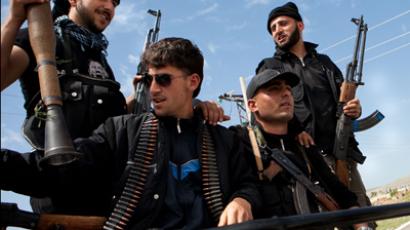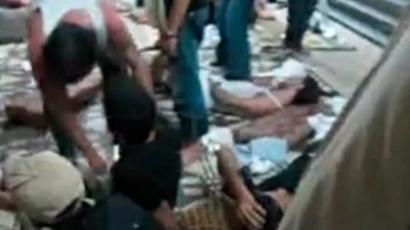Assad lost all legitimacy, UN monitors shot at trying to reach Syria massacre scene - Ban Ki-moon
UN chief Ban Ki-moon has condemned the massacres in Hama and Houla, where over 170 people died, in his strongest ever dressing-down of official Syria. The Assad government has lost its legitimacy, said Ban.
"Each day seems to bring new additions to the grim catalogue of atrocities: assaults against civilians, brutal human rights violations, mass arrests, torture, execution-style killings of whole families," thundered the UN Secretary General addressing a special session of the UN General Assembly.On May 25, 108 people were killed in the village of Houla in western Syria, nearly half of them children. Activists said the atrocity was carried out by a pro-Assad militia known as Shabbiha. Syrian authorities blamed Islamist militants for the massacre."Men, women, even children were executed at a point blank range; some had their throats slit or their skulls crushed. Any regime or leader that tolerates such a killing of innocents has lost its fundamental humanity," said Ban.UN monitors were also shot at with light arms while going to Mazraat al-Qubeir in the Hama region, trying to assess the overnight slaughter, where dozens were reported killed. Initially, the monitors were denied entry at all, said the UN chief."For many months it has been evident that President Assad and his government have lost all legitimacy," Ban stressed.The UN’s priority remains to stop the violence and protect civilians and their rights, to deliver humanitarian aid to those in need and to advance a political solution to the crisis. Kofi Annan’s six-point peace plan is still “the centerpiece of these efforts.” But the ability of the regime and some of the opposition to adhere to the road map shows "a gloomy picture.""The dangers of a full-scale civil war are imminent and real. Now it is the time for the international community to take a bold and consorted action," said Ban, wrapping up his speech.
'Third party acting in Syria' – Annan
Some attacks in Syria clearly speak of a "third actors'" presence, said UN-Arab League special envoy Annan taking over from Ban."We cannot allow mass killing to be part of daily life in Syria," he said.Annan is concerned the Arab country, which plunged into a civil conflict over a year ago, is growing more polarized and radicalized every day. Although Assad cites a militant threat, the envoy in convinced the government bears prime responsibility for the country's security.The envoy was forced to admit that both sides to the Syrian internal conflict are not fully abiding to his peace plan, considered to be in effect since April, even despite the deployment of UN monitors.But, echoing Ban, Annan also called for a joint international action."We must act as one. Individual actions or interventions will not resolve the crisis," he concluded.Syria’s envoy to the UN lashed out at the Arab League for accusing Assad’s government of being behind the Houla massacre before the investigation was over. He also declared that Syria is ready to receive an inquiry commission made up of states “known for their refusal to interfere in Syrian internal affairs.”The envoy laid blame for recent killings on the Salafi movement, al-Qaeda and other extremist and terror organizations. He also said the violence in his home country is a result of foreign efforts.“Some countries contribute to Syria's escalating violence by propaganda and by assisting illegal military groups,” the envoy told the assembly.Russia, too, warned against arming and financing Syria’s opposition, as would facilitate a “terror environment abused by a third force.” Condemning the massacres in Houla and Hama, Russian envoy Vitaly Churkin called on the Assembly not to be caught up in the “provocations aimed at disrupting Annan’s plan.”“Winding up the confrontational spring is unacceptable,” Churkin said, urging for an international conference on the Syrian crisis, which would involve powers with real leverage on the Syrian regime and multiple opposition groups. According to Russian diplomats, this plan has already been approved by China, France and Iran.
‘Syria is not Libya. It will not implode. It will explode’ – Annan
Following the General Assembly briefing, Ban, Annan and Arab League Secretary-General Nabil al-Arabi addressed the matter before the UN Security Council. They later briefed the press on the results of that meeting.Ban repeated his concerns that the situation in Syria was very grave.“Syria can go from a tipping point to a breaking point,” he warned. “No one can predict how the situation in Syria will evolve.”Once again Ban lay most of the blame on the Syrian government.“We see little evidence that the regime is complying with the six-point peace plan,” he noted. However, he also stressed that “all the violence, both by government forces and opposition forces must stop.”Ban said that a number of solutions were discussed by the Security Council, but that all of them had the goal of ending bloodshed and starting a political dialog. He underscored that “unity is essential” in resolving the Syrian crisis. Annan largely echoed the UN Secretary General's words. He stressed that his plan was not “dead” and that support for it was reiterated by the Security Council members. “I’m not sure whether it’s the plan that is dead, or whether it’s the implementation that’s lacking,” he noted, responding to a question posed by a journalist. “The question is how do you get the Syrian government to implement it even at this late hour.”He also discussed a number of solutions, including setting up a special contact group that includes nations with leverage over the situation in Syria, as well as appointing an interlocutor. In any case, he stressed the need for both international and regional players to be involved in carving out a solution.Annan also warned of the potential ramifications of escalating strife in Syria for the entire region.“Given the level of violence, you could say we are drifting into a sort of a civil war,” he also warned. “All efforts are made that if it does become a full-blown civil war, it doesn’t spread elsewhere. Syria is not Libya. It will not implode. It will explode.”He also took note of the role Iran could play in resolving the crisis. “Iran will be important part of the solution," he said.He condemned calls for any further militarization and underscored the need to closely follow his peace plan, as well as the UN Security Council resolutions and guidelines. “Any further militarization of the conflict will lead to disastrous consequences,” he warned. Arab League chief al-Arabi said there was a need for action to be taken, including the possibility of applying Chapter 7 provisions.“Any action group that leads to concrete steps to stop violence should be welcomed,” he said.
‘No UNSC mandate for foreign intervention into Syria’ – Lavrov
Moscow hopes all the parties that can influence the Syrian crisis will take part in a proposed conference, says Russia’s Foreign Minister Sergey Lavrov following the UN session, from Kazakhstan. “The conference should come under the UN umbrella,” said Lavrov, adding the global discussion would not be a one-time event.“The first stage would exclude any Syrian representatives,” he continued. “Its purpose would be to agree on the leverage to be used on each and every Syrian group: be it the government or various opposition forces – to stop the violence and start a dialogue.”The FM listed Qatar, Saudi Arabia, Lebanon, Jordan, Iraq, Turkey, Iran, the League of Arab States, the EU and the Organization of Islamic Cooperation among the “integral parts” to the process.Much depends on the Syrian opposition, and more particularly, on the National Syrian Council, based in Istanbul, pointed out the minister. The group harshly opposes any dialogue with the Assad government, and is promoting armed resistance until the UN Security Council mandates a foreign military intervention into Syria.“There’ll be no mandate by the UN Security Council for a foreign intervention, I guarantee you that,” Lavrov told journalists.














